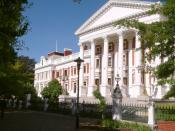Britain, in its unique position as the former colonial power and the major investing country in South Africa, had been one of the main targets of Black South Africans' diplomatic efforts since the establishment of the Union in 1910. By the end of World War Two and the following election of the Nationalist Party in 1948, most of the hopes for British support of the predicament of Black South Africans had shifted to the United Nations (UN) and the newly independent African states. Nevertheless, because of its economic and historic links Britain, and London in particular, continued to hold a special relationship with South Africa. From the 1950's, British support did eventually start to come, not from the Government though, but from anti-apartheid and church groups, and sections of the Labour and Liberal Parties. Moreover, ever since the 1940's, a growing number of South Africans had been arriving in London, which, after Sharpeville and the banning of the African National Congress (ANC) and Pan-Africanist Congress (PAC), became a centre for the exiled liberation movements to continue their struggle from abroad.(1)
In 1959, following a call for the boycott of South African goods by the ANC, a Boycott Movement was started in London. In April of the following year, as the emergency situation in South Africa intensified, the Anti-Apartheid Movement (AAM) was formed to co-ordinate all the anti-apartheid work and to keep South Africa's apartheid policy in the forefront of British politics. The Movement was able to attract a wide and diverse range of support, from the British Communist, Liberal and Labour Parties, to the Trade Union Congress (TUC), individual MPs, the NUS, several Churches, and other organisations working against apartheid. From the onset, the Movement, which "operated [...] as an instrument of solidarity with the people of South Africa", was...



Hmmmmm..........
As a South African myself, this is a little biased (I find)... a little bit from the Brit's POV.
5 out of 6 people found this comment useful.